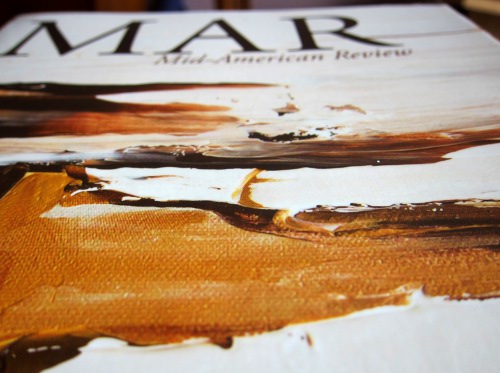This entry is a repost from Fiction Editor Laura Maylene Walter’s personal blog. Laura discusses her first year working for Mid-American Review as Assistant Fiction Editor, how MAR submissions defied her expectations, and general tips for writers interested in submitting to MAR. The opinions expressed here are Laura’s and do not necessarily reflect the views of the rest of the editorial staff. Now that we’ve gotten through that disclaimer, let’s dive into Laura’s take on MAR’s reading process:
We really do read everything. Like many writers, I’ve had my suspicions that certain journals don’t really read all their submissions – that they fill their magazine pages with solicited material and/or send huge chunks of submissions into the trash bin unread – but I’m happy to say this is definitely not the case at MAR. Not only do we read everything, but we approach each story in good faith, with good intentions, and with the hope that this one might be a “yes.”
The quality of writing is stronger than I expected. Over the years, I’ve heard plenty of horror stories about the draining and hopeless process of reviewing submissions. Thankfully, I haven’t experienced that. Not every story is for MAR, and not every story we receive feels ready yet, but the quality of the average submission is higher than I anticipated. Reading submissions is also a reminder of just how many people out there are writing and maintaining the hope that someone will say “yes.”
That infuriating “Sorry, this isn’t for me” line is true. I might recognize a story has many admirable qualities and is strong, but it either doesn’t float my boat or just wouldn’t fit with the aesthetic of the magazine. When I come across a story like this – one that’s strong but isn’t to my personal taste – I still forward it to staff members to see if anyone else feels differently.
We don’t always agree. Reading for MAR reminds me many times over how subjective this business is. Sometimes the differences are subtle – I might love with the voice of a piece while another reader is only vaguely interested – while other times it’s a dramatic difference in opinion. For example, I might be an emphatic “no” on a particular story that another editor is willing to fight for, or vice versa. To make it even more interesting, this same editor and I might generally have a similar aesthetic, so there’s no predicting how we will each react to an individual story.
A connection is by no means a golden ticket. Very rarely, someone on staff might personally know one of the writers we’re discussing, or perhaps stories from past MAR contributors or other writers with some sort of “connection” enter our reading pile. Believe it or not, these relationships don’t make the journey to publication in MAR easier. Not even close. We discuss everything based on its own merits and how it might fit in with our publication.
Cover letters don’t matter much. I view cover letters as unnecessary but sometimes helpful tools that might satisfy my curiosity about a writer. A long list of impressive credentials is all fine and good, but it doesn’t mean I’ll love the story that writer submitted. On the flip side, if a writer has no previous publications, I’ll hold out hope that this story could be her first winner. And if a writer leaves the cover letter section blank in our online Submissions Manager, I couldn’t care less. It’s the story that counts.
I don’t like sending rejections. I’ve received enough rejections in my writing career to cringe at the thought of a writer opening an email from me that includes a rejection. It’s not fun, and I don’t think any literary editor enjoys it. But it’s part of the job.
We’re doing our best. I know what it’s like to be stuck waiting eight months or longer for a response from a journal, but now, I also know what it’s like to face thousands and thousands of pending submission in the Submissions Manager. We don’t like to be behind, but because we actually read everything, get second or third or fourth opinions on work, and are open to free submissions year-round, it happens. Please be patient with us.
You’ve heard it before from other journals and editors, but it’s true: We really, really want to find stuff we love in the slush. It’s such a treat to stumble across a compelling story or strong voice while reading submissions.
Actually, we don’t use the word “slush.” Slush is the word I use to mentally refer to the huge pile of submissions sent through our Submission Manager because that’s what I’m used to. In reality, however, I haven’t heard that term thrown around by other readers at MAR. We view our submissions as simply that: submissions sent by hardworking writers.
Laura Maylene Walter, Fiction Editor
Original post: Submit to Me: Inside the Mid-American Review

